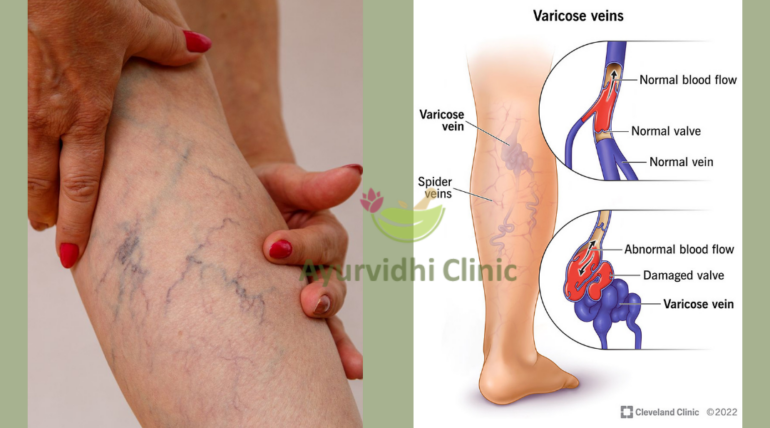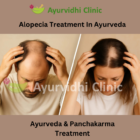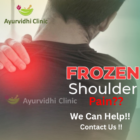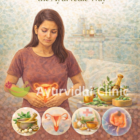Say Goodbye to Varicose Veins with Ayurvedic Treatments
Introduction: Understanding Varicose Veins
Varicose veins are a common vascular condition of veins characterized by enlarged, prominent, twisting of it that often appear blue or purple. While they can occur anywhere in the body, they most commonly affect the legs and feet. In Ayurveda, a varicose vein is understood as a disorder of Vata dosha, leading to weakened blood vessels and impaired circulation.
In this blog explores the Ayurvedic perspective on varicose veins, including their causes, traditional treatments, and dietary recommendations for optimal vein health.
Ayurvedic View of Varicose Veins
According to Ayurveda, varicose veins result from an imbalance in Vata dosha, the energy that governs movement and circulation in the body. When Vata becomes aggravated, it can cause the veins to lose their elasticity and become swollen and twisted. Other doshas, particularly Pitta and Kapha, may also play a role in exacerbating this condition. Ayurvedic treatment focuses on balancing the doshas, strengthening the veins, and improving circulation to alleviate symptoms and prevent further complications.
Causes of Varicose Veins in Ayurveda
- Sedentary Lifestyle: Lack of physical activity can lead to poor circulation and weaken the veins over time.
- Prolonged Standing or Sitting: Jobs or activities that involve long periods of standing or sitting can increase pressure on the veins and contribute to varicose veins.
- Genetic Predisposition: A family history of varicose veins may increase the likelihood of developing the condition.
- Imbalanced Diet: Consuming excessive spicy, oily, and heavy foods can aggravate Vata and contribute to circulatory issues.
- Chronic Constipation: Straining during bowel movements can put pressure on the veins in the abdomen and lower body.
- Age: Sometimes age is a factor for developing varicose veins in people. As we age the body loses its tensile fibers and collagen that keeps skin tight. This results in loosening of skin and ultimately results in varicose veins.
Ayurvedic Treatment for Varicose Veins
Ayurveda focuses on individual dosha and prakruti for better results and recovery. The herbal remedies mentioned in the description are for the sake of knowledge please consult your Ayurvedic doctor for the medication.
- Herbal Remedies: Ayurvedic herbs like Triphala, Guggulu, and Rasna, Erandamula, Dashamoola are commonly used to improve circulation, strengthen veins, and reduce inflammation.
- External Applications: Local application of herbal pastes or oils that contain ingredients like neem, turmeric, and dasmoola can help reduce swelling and discomfort in the muscles and ultimately affect varicose veins.
- Dietary Modifications: Emphasize foods that pacify Vata dosha and support healthy circulation, such as warm, nourishing soups, cooked vegetables, whole grains, and herbal teas.
- Lifestyle Changes: Incorporate regular exercise, particularly gentle activities like walking, swimming, and yoga, to improve circulation and strengthen the muscles surrounding the veins.
Panchakarma Treatment for Varicose Veins:
Panchakarma, the traditional Ayurvedic detoxification therapy can be beneficial in managing varicose veins by removing toxins, balancing the doshas, and promoting overall health. Specific Panchakarma treatments that may be recommended include:
- Abhyanga (Ayurvedic Oil Massage): Regular oil massage improves circulation, reduces inflammation, and nourishes the skin and tissues. Ayurvedic medicated oils such as Mahanarayan Tailam, and Dashamoola Tail seem beneficial in treating a massaging the varicose veins.
- Swedana: The process of ayurvedic fomentation helps to relax the muscles of thighs and calves and relieves the pain and discomfort in the veins which are prominent due to varicose veins. For this Churna pottali massage is preferred for the treatment. The churn or powder reduces the swelling reduces discomfort and helps to strengthen them.
- Virechana (Therapeutic Purgation): To detoxify the blood and balance Pitta dosha Virechana is done in varicose veins patients.
- Basti (Enema Therapy): As we have seen varicose veins are a disorder of vaata dosha. So the Basti treatments with medicated oils or decoctions can help alleviate Vata imbalances and strengthen the veins. It also nourishes and strengthens the veins.
Ayurvedic Diet for Varicose Veins: Do’s and Don’ts
- Do’s:
Embrace a diet rich in fiber, antioxidants, and nutrients to support vein health.
Include fresh fruits, vegetables, whole grains, and legumes in your meals.
Stay hydrated by drinking plenty of water to promote circulation.
Consume foods that are cooling and nourishing, such as ghee, and coconut.
- Don’ts:
Avoid spicy, oily, and heavy foods that can aggravate Vata and impair circulation.
Limit caffeine and alcohol intake, as they can dehydrate the body and worsen varicose veins symptoms.
Reduce intake of salty and processed foods, as excess sodium can contribute to fluid retention and swelling.
Minimize consumption of red meat and fried foods, which can increase inflammation and exacerbate varicose veins.
Conclusion: Nurturing Vein Health with Ayurveda
Varicose veins can be a source of discomfort and concern, but with the holistic approach of Ayurveda, there are natural methods to manage and alleviate symptoms. By addressing the root causes of varicose veins, balancing the doshas, and adopting a supportive diet and lifestyle, individuals can promote healthy circulation, strengthen vein integrity, and experience relief from this common vascular condition. For best ayurvedic & panchakarma treatment for varicose veins Ayurvidhi Clinic ayurvedic & panchakarma clinic is best for ayurvedic treatment. At Ayurvidhi clinic we have successfully cured varicose veins with pure ayurvedic and panchakarma treatment.






Recent Comments